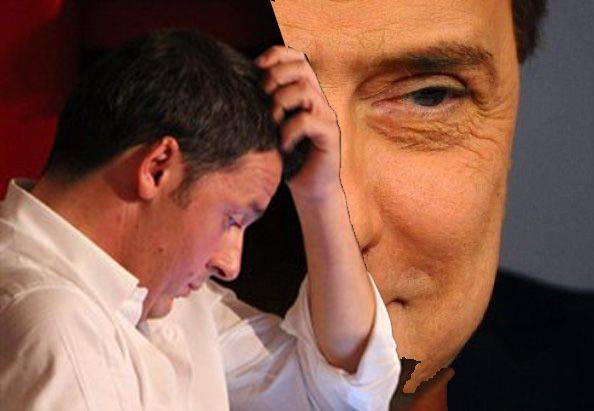Premier Matteo Renzi Runs the Obstacles
ROME – Next week former Premier Silvio Berlusconi , 77, begins his gig as social worker in an old folks home four hours a week. This punishent for his tax fraud conviction is sufficiently minimalist that Berlusconi is now back to attacking fiercely Premier Matteo Renzi , 39. Berlusconi’s weapon of choice: the revised election law slangily called the "Italicum,” one of Renzi’s points of honor. In January the two had struck an agreement on the essentials of the bill, which in fact was passed easily in the Chamber of Deputies March 12 with 365 ayes, 156 nays and 40 abstentions. But since then the bill has been stalled in the Senate, and now Berlusconi threatens to renigue on their agreement. If so, Renzi says it will succeed even without Berlusconi.
That is not the only problem Renzi faces, but he has an important ace up his sleeve. His two immediate predecessors were both distinguished men, yet both lasted only briefly. Appointed to deal with the recession, economist Mario Monti served as technocrat premier from November 2011 through December 2012. When he failed ("he was unable to explain himself," as one pundit put it), the professional politician Enrico Letta, 48, took over until February 2014. If Renzi is to succeed, the qualities which distinguish him from these predecessors are those which will keep his governance from being more than a brief interlude. Like them, he did not become premier as the consequence of a political election; other politicians, not electors, tapped him.
Nevertheless a crucial difference marks his government. Before being named premier, Renzi won the backing of 68% of the three million voters of the Partito Democratico (PD), no mean feat. As party secretary, he has coaxed and bulldozed most--if not all--of the PD's entrenched power groups and old-line political hacks into supporting him. As a result, he has already remolded the largest single party in Italy into a more modern and flexible entitity than before his time.
Sergio Fabbrini, director of the Luiss School of Government of Rome, sees Renzi nevertheless under permanent attack. Fabbrini believes that Renzi’s own group of MPs and senators, who represent a wide variety of interest groups, back Renzi only in order to remain in office as long as possible. Secondly, his governing coalition partner Angelino Alfano, who broke with Silvio Berlusconi in order to remain in power with Renzi, must continually demonstrate his independence from Renzi. Third, Renzi must battle the notoriously powerful megacrats for whom the ministries are feifdoms, no matter who is the official government.
As a result, says Fabbrini, "If Matteo Renzi wants to govern the country for four years, he will have to act as if his government will last only four months.... He must adopt policies that demonstrate no uncertainty." And this is exactly what the go-for-broke, self-assertive Renzi has been doing. Even though the battle has been tough, as the incomplete revision of the election law shows, much is being accomplished.
In March the government addressed the labor question, including measures aimed at opening the doors to the nation's 50% of unemployed under-25s. Renzi is implementing what he calls, in English, a "Jobs Act." (In English the term derives from "Jumpstart Our Business Startups Act," a U.S. law intended to ease financing for small businesses.) In the Renzi version, on March 12 a Council of Ministers decree indefinitely extended three-year work contracts, eased hiring of apprentices and permited more generous fiscal detractions for employers. Carrying forward some labor market corrections begun under both Monti and Letta, the decree incorporated proposals by both Confindustria (the association of manufacturers) and the trade unions, despite the open hostility both consistently show to Renzi. By May 20 the decree must be converted into law.
The April goal was action on reform of the public administration. Renzi slashed overly generous salaries for top state managers as well as salaries for administrative underlings. His government continues to press to reduce the size, cost and authority of what some call an "overly symmetrical bicameral legislature" by reducing the size of the Senate to reduced to 148 members--less than half today. A reformed Senate would not participate in votes of confidence or on the budget. This discussion continues.
In addition, the Chamber of Deputies abolished the provincial governments that are the U.S. equivalent of counties in a 215 to 158 vote. Provincial delegates will no longer be elected, and their responsibilities pass to the regions and to local mayors. For Berlusconi's Forza Italia, this was a "coup d'etat." The financial daily Il Sole/24 Ore had reservations, calling it a halfway measure because, while eliminating the powers of the provinces, their administrations remain. "I understand the need to give a signal that things are changing," but so far the change is in name only, said Antonio Saitta, president of the Italian Union of Provinces.





































i-Italy
Facebook
Google+
This work may not be reproduced, in whole or in part, without prior written permission.
Questo lavoro non può essere riprodotto, in tutto o in parte, senza permesso scritto.